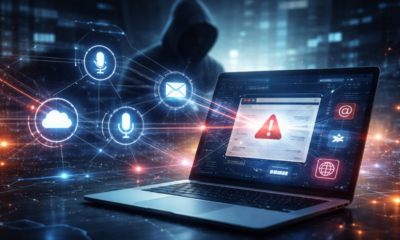Cybersecurity
How AI Will Impact Both Cybersecurity and Cyber Attacks

Cybersecurity is set to be one of the areas most impacted by artificial intelligence (AI) technologies, with both organizations and cyber criminals deploying AI in their own ways. As AI increases the risk and effectiveness of cyber attacks, organizations must also increase their efforts. The future outcomes of such attacks will greatly depend on who has a better grasp of AI technologies.
Here is a look at the different ways AI will impact cybersecurity and cyber attacks:
AI-Powered Cyber Attacks
As we become more of a digital world, the risk of AI-powered cyber attacks also dramatically increases. AI and machine learning are not only used by IT security professionals, but they are deployed by state-sponsored actors, criminal cyber organizations, and individuals.
All of this means companies and governments will have to constantly evolve their practices to keep up with the changing technology.
Here is a look at some of the ways AI is used to power cyber attacks:
- Social Engineering Attacks: Cybercriminals employ AI in their social engineering attacks since it can detect patterns in behavior. This insight can then be used to manipulate behaviors, gain access to sensitive data, and compromise networks.
- Mutating Software: AI can be used to develop mutating malware that avoids detection by changing its structure.
- Data Manipulation: Data manipulation can have a devastating impact on organizations if they fail to detect it. Once it gets past this point, it is extremely difficult to recover the correct data that feeds AI systems.
- Identifying Vulnerabilities: AI can be used to constantly monitor networks to detect new vulnerabilities. Human hackers can then take advantage of those vulnerabilities.
AI-Based Security Systems
For organizations, there are also many ways to implement AI to protect against AI-powered attacks. We are moving into a world where AI will be both the attacker and defender.
Here is a look at some of the ways AI can be used for security:
- Threat Preparedness: By embedding AI into a security system, it can help organizations develop a stronger threat response. By providing the latest information regarding global and industry threats, leaders can prioritize resources accordingly.
- AI-powered Threat Detection: Companies can use AI platforms to collect and store network metadata and gain security insights. By using the metadata and machine learning techniques, cyber attacks can be detected and prioritized in real-time.
- Response Time: AI-based detection and response systems can help an organization better its threat detection and response capabilities for advanced attacks. They help respond to data exfiltration, advanced targeted attacks, ransomware, malware, social engineering, and encrypted attacks.
- Mobile Device Protection: AI is used by major companies to analyze mobile endpoint threats and protect personal mobile devices. AI is incorporated into anti-malware solutions and can address network, device, and application threats.
- Security Analyst Augmentation: Machine learning can augment human analysts by automating repetitive tasks involving things like data enrichment, and it allows human analysts to address higher-order threats first.
As machine learning and AI continues to revolutionize more aspects of our digital world, the threat of cyber attacks will drastically increase. Companies and outside actors alike will utilize the technology to increase efficiency of security and attacks. Both of these aspects of the cyber environment will rely less on humans, so it is crucial to stay up to date on the latest technologies and their capabilities.












